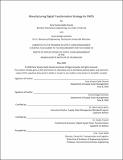Manufacturing Digital Transformation Strategy for FMCG
Author(s)
Gallo Orjuela, Sara; Ortega Camacho, Anais
DownloadFull capstone (2.993Mb)
Metadata
Show full item recordAbstract
Manufacturing companies are facing serious challenges to survive and succeed in the market in this ever-changing economy. The FMCG industry is not unaware of these challenges, and therefore, many leading manufacturing companies are creating initiatives of Smart Manufacturing or Industry 4.0. However, the literature on Digital Manufacturing mainly addresses technical aspects of the implementation and not the design of a complete strategy, which involves not only technologies but also the organization and external components like customers or suppliers.
Our project aimed to close the gap between the technological components of a Digital Transformation
and the human factor. Therefore, this project could be considered a multiple methodological approach.
On one side, the study is based on the collection and analysis of data obtained from the ERP System of
the company. On the other hand, the project relies on a survey to discover the digital maturity of the bottling plants to include the human factor. Thus, the sponsor company will have the base information to
implement a Digital Manufacturing strategy.
With the information captured from the ERP System, we performed a cluster analysis to group the bottling plants into smaller groups that have similar performance characteristics. Moreover, with the results of the surveys, we examined the perspectives of the operational team from all bottling plants. Consequently, plants can be group depending on their operational performance and digital maturity of their organizations.
Finally, managerial recommendations for all clusters were provided. In some cases, where digital
technologies are more advanced, the goal is to exploit this competitive advantage and introduce more
sophisticated methodologies to analyze the data and create value-driven decisions. In other cases, before starting with the implementation of new digital technologies, employees must be prepared to receive new technologies and learn how to work in a digital world.
Date issued
2020-08-06Keywords
digital transformation, manufacturing